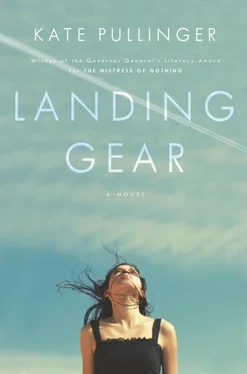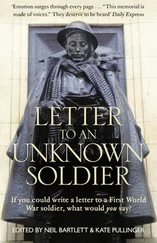“It doesn’t say anywhere that he flew into the river. It’s not in the police report.” He looked at the window, into the sky. “But I saw him.”
Emily got along well with Michael, but mainly because she flattered him by asking him for financial advice and, subsequently, acting on that advice. When her father died, she inherited a savings bond that matured soon after; she’d been sitting on the money. Michael had helped her invest it. He told her that he was impressed that someone so young was interested in her financial future. She wasn’t interested in her financial future; she was interested in getting along with Michael, so it had been a good investment. She thought that when Michael thought of her, if he thought of her at all, it was with a certain degree of fondness.
Of all her interviewees this week, it had been Michael who was the most difficult to persuade. “No,” he’d said the first time she asked. “No, not me.”
“But I need you to talk to me. If you’re not there, a piece of the story is missing.”
“This is about you and Harriet,” he said. “It’s not about me.”
“But you are important to the story. Look,” Emily said, “you might as well agree now. Otherwise, you’ll have to put up with my badgering until you do agree.”
“Why?” Michael asked. “What can I add? What is this documentary about, anyway?”
She badgered, and eventually he agreed.
She opened the door to him. He came straight in, took off his jacket and sat on the sofa. “Is this where you want me?” he asked, rolling up the sleeves of his white shirt. He was on his way home from work.
She looked at him through the camera. “Shift a little to your right, please.”
He shifted. She could smell the day on him.
They spoke at the same time. “So…” Emily began.
“Let’s get started,” Michael said.
“Okay,” she said, and she pressed Record.
She looked at him through the viewfinder. “Wait a minute.” She adjusted the lighting. Michael sat very still on the sofa, legs crossed elegantly, one arm along the sofa’s back. She looked at him again through the viewfinder. The effect was odd. She was startled by what she saw—Michael was one of those people, surprisingly rare, who look better on camera than in real life. The combination of lens and lighting did something to his face, made his skin look luminous, made the bones beneath his skin appear sharper, his whole face more focused. He’d got back into shape since they’d first met; he didn’t look any younger but had become handsomer somehow. He looked relaxed and at ease with himself in a way she would never have anticipated.
“Okay,” she said again.
Michael looked at his watch.
Emily felt slightly panicked. “You’ve been very kind to Yacub.”
Michael gave her a yes-of-course-what-did-you-expect look.
“Not everyone would have been so kind.”
“I wasn’t exactly thrilled when I first discovered Harriet had brought him into our home. But once he was there, not even I was heartless enough to throw him out onto the street. And Harriet, well, don’t forget, she’d been unemployed for two years then.”
Emily thought about Harriet.
Michael continued. “She needed a project. No, that’s wrong. Damn.” He shifted in his seat, looking pained.
“What?” said Emily.
“Sometimes when I talk about my wife I sound so patronizing. The truth is, I needed a project. We both did. Helping Yacub sort himself out—God, now that sounds really patronizing.”
“Start again,” said Emily. “Start again.”
“Harriet had not had a great couple of years. Being unemployed did not suit her. It wouldn’t suit me either—neither of us, we’re not hobby people. We don’t have interests . We like our jobs. We like our home. We like our son. We watch a bit of TV. We read. We go to the odd movie. Harriet inhabits the internet. I read the financial pages.” He laughed, then stopped abruptly. “We’re not itching to get on with that thing we’ve been putting off all our lives, like some people—I don’t know—write that novel. Genealogy. Gardening. That kind of thing. If I got fired, I’d be one of those men who dresses for work every morning for the job that no longer exists and then sits on a park bench while trying to figure out the most efficient way to kill myself.”
Michael took a deep breath, uncrossed and crossed his legs. “You’re young, Emily, and you’ve never been married,” he said. He looked rueful.
She didn’t reply. Unlike the others, Michael didn’t seem to need her to reply. For all his reluctance, he was a natural.
“Marriage is, well, it’s kind of epic. It is epic. You forget about it for years and years, you carry on living together, when your kid is small, while you’re both working, the sports days, the school plays, the anniversaries. The fucking anniversaries. That’s when it hits you. That’s when you think—hoo boy. Year after year. The person you’re married to has become like part of your own body, except separate, and at times annoying. There. There all the time. No question about that. The truth is it can be a bit dull. If you let it.”
He rubbed his hands up and down his face. “Why am I talking about marriage? I look at you and I feel the need to talk about my marriage. Sorry. Edit that bit out. Please.”
“Don’t worry about it.”
“Marriage is not easy. How can something that’s so much a part of the fabric of your life be so difficult? God.” He looked away, toward the window. “Jack’s going to hate this.”
“What do you mean?”
“We had a tricky time, Harriet and I, a few years back. My fault, of course, but not entirely. There was always something else, something that came between us. Jack was getting older and turning away from us.”
“Can you be more specific?”
Michael smiled at the camera. “No,” he said.
And the interview was over as quickly as it had started.
Harriet arrived, apologizing for the two large shopping bags full of food. “It’s one of the good things about being back at work,” she said, “no time to go to the supermarket.”
Emily laughed.
Harriet handed her the bouquet of flowers she’d bought for her and gave her a kiss on the cheek. “Lovely to see you,” she said.
Emily breathed in Harriet’s perfume. “Thanks for coming.”
“I don’t have long,” she said. “I have to get home and cook supper for the boys.”
“Can’t the boys cook for themselves?”
“They can,” Harriet said with a nod, “but there’s no food in the house.”
“Can’t they do the shopping?”
Harriet gave her a look.
Emily ducked her head.
“Come on,” Harriet said, “let’s do this thing.”
Emily took the flowers into the kitchen and put them in the sink. Harriet carried the shopping into the sitting room and placed the bags on the floor, on either side of where she sat on the sofa, like protective buttressing or sandbags.
“You can leave those by the door,” Emily said.
Harriet shook her head. “They’re fine here.” She looked down at the bags. “Sorry,” she said. “That’s weird.” She got up and moved the bags near the front door before sitting down once again. “Michael told me it wasn’t too bad,” she said, “your interview. He said he waxed philosophical on the topic of marriage.” Harriet winced. “Was it okay?”
“He was great. He’s coming back for more on the weekend.”
“Okay,” she said. “I’m nervous.”
“Would you like a glass of wine?”
“A glass of wine!” Harriet said. “Good idea.”
Emily returned to the kitchen, took the cork out of the bottle and poured two large glasses of white wine. Her hands shook.
Читать дальше












